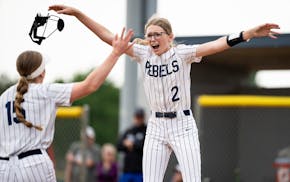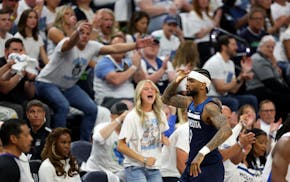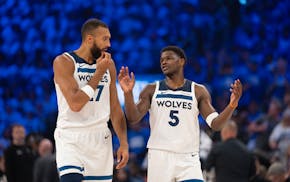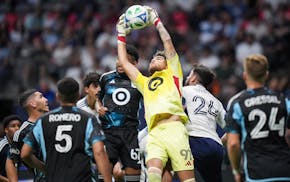P.J. Fleck's first collegiate coaching job was serving as a graduate assistant at Ohio State under coach Jim Tressel in 2006, working for a Buckeyes team that reached the BCS Championship Game.
So it should come as no surprise that Fleck's coaching philosophy has roots in what's known as "Tressel-ball," the run-heavy, conservative approach that his mentor rode to three national title game appearances, one championship, and 229 wins in his Hall of Fame career.
With the Gophers, Fleck's approach of such complementary football — with the offense, defense and special teams feeding off each other — has helped deliver seasons of 11-2 and 9-4 (twice), all since 2019.
But this has been a rough season for Fleck's cautious philosophy. Upset losses to Northwestern and Illinois have infuriated some fans, who have grumbled and booed some of Fleck's choices.
"Game management is always going to be under criticism," said Gerry DiNardo, a Big Ten Network analyst and former coach at Indiana, LSU and Vanderbilt. "… P.J. has proven himself as a really good game manager. Does that mean he's been 100%? Probably not, but who is?"
Minnesota enters Saturday's game at Purdue with a 5-4 record, still needing one more win to achieve bowl eligibility.
The Gophers haven't been consistently sharp in any facet — offense, defense, special teams or coaching.
"Having the harmony between offense, defense and special teams really is the key,'' Tressel said by phone Friday. "... That harmony is what a team is all about."
For Fleck, trying to develop consistency with his team has been a seasonlong pursuit that's even more important now.
"Whatever happens in November, good or bad, gets magnified," Fleck said.
A week ago, the Gophers were in a four-way tie atop the Big Ten West Division, and a win over Illinois would've put them in good shape to advance to the conference title game for the first time. Instead, the Fighting Illini capitalized on catastrophic Gophers mistakes to sneak out of Huntington Bank Stadium with a 27-26 win.
Now, the Gophers likely will need wins over Purdue and Wisconsin in the Nov. 25 finale, plus two losses by Iowa, to reach the Big Ten title game in the final year of divisional play in the conference.
"We haven't put it together a complete game, and that falls on me as the leader, as the QB," Gophers sophomore Athan Kaliakmanis said. "… We just have we have to put it together, and we will."
Beating the clock
On Oct. 28, the Gophers beat Michigan State 27-12 by pulling away on the strength of 19 consecutive running plays in the second half, Tressel-ball at its utmost.
Late in the first half, however, fans groaned their displeasure over Fleck's in-game strategy. The Gophers had driven from their 5-yard line to the Michigan State 20 with just less than a minute left. Instead of immediately calling a timeout, Fleck let the clock run down to 35 seconds. That drew plenty of boos from the crowd, which feared the coach was frittering away valuable time to settle for a field goal rather than trying to score a touchdown. Two plays later, the strategy worked, as Kaliakmanis completed a 22-yard TD pass to Daniel Jackson for a 10-6 lead with 19 seconds left.
Afterward, Fleck acknowledged the crowd's consternation, saying his aim was to not leave Michigan State with enough time to score.
"I'm doing everything I can to see both sides of everything," he said. "I'd love to educate everybody that buys a ticket because I appreciate everybody buying a ticket. I want to educate them. I can't give [Michigan State] the ball back with time.''
Against Illinois, a similar scenario played out, and Fleck's strategy didn't work quite as well.
With the score tied 14-14, the Gophers methodically drove to the Illinois 23 with 4:15 left before halftime. After runs of 1 and 2 yards, Fleck let the time wind down. With 2:11 left, on third-and-9, Jordan Nubin gained 4 yards on a draw play, drawing grumbles from the crowd. Fleck called timeout with 1:25 left, and Dragan Kesich kicked a 36-yard field goal for the lead.
"Why not pass on third down and go for a touchdown?" Fleck was asked afterward.
"Cover 2 is a really good run defense to run into," he said of the Illini's alignment on the play. "They probably weren't thinking we were going to run the football. … And if we just finish a block, we got a chance to pop it and that looks like a great call."
Instead, Fleck took the sure three points instead of trying for four more that, using hindsight, might have come in handy in a one-point loss.
Fleck explained that getting at least a field goal was the priority in what he calls the "middle eight," the last four minutes of the second quarter and first four of the third. Illinois was getting the ball to start the second half, and that factored into his decision.
"Would you love touchdowns? Absolutely," he said. "But what you can't do is not have points."
Passing game stalls
Much of the criticism of Fleck centers on the Gophers passing game. Tanner Morgan was outstanding in 2019 with 3,253 passing yards and 30 touchdowns while throwing to future NFL wideouts Rashod Bateman and Tyler Johnson. In the four seasons since then, however, Minnesota has 41 TD passes, including 10 this year.
Kaliakmanis has shown flashes of solid play, such as his 9-for-11, two-TD first half against Illinois, but has been inconsistent, as evidenced by his 54.1 completion percentage. He hasn't been helped by a receiving corps that has dropped 16 passes, according to Pro Football Focus. Tight end Brevyn Spann-Ford has six of those drops and wideout Corey Crooms Jr. has four, including a would-be TD catch against Illinois.
Offensive coordinator Greg Harbaugh Jr. sees Kaliakmanis taking steps forward week by week.
"The best way I can describe it is: He was just a quarterback early in the year," Harbaugh said. "Now he's playing the position, he's handling the situations."
Added DiNardo, "Kaliakmanis just needs reps and reps and reps."
Patience is a tough sell to a fan base eager for a big winner. The 2019 season — with Minnesota's first top-10 final AP ranking in 57 years — gave them a taste, but they're still waiting for the breakthrough of reaching Big Ten Championship Game. The fans' hope is that the Gophers haven't squandered their chance in the last season of divisional play.
Tressel, who also led Youngstown State to four Division I-AA championships and later spent 10 years there as president before retiring in February, understands how fans can become impatient but offered the reminder that a program's growth isn't always linear.
"The good news is he has had the kind of success that people have learned to enjoy, and now they're disappointed if it's not quite as successful," Tressel said. "That beats the heck out of people sitting round and saying, 'Yeah, it's the same old team.' "

Champlin Park shuts out Rogers 1-0 to win Class 4A, Section 5 softball title

Twins affiliate rained out more than any team: 'Never seen anything like this'

Three key Timberwolves players could enter free agent market

Souhan: If Edwards is a franchise player, he needs to act and play like it

